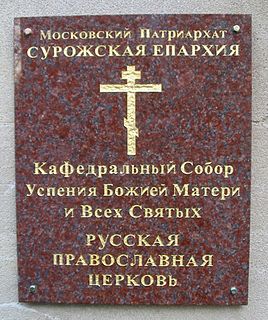History
The origins of the Diocese stretch back to the founding of the first Russian Orthodox parishes in Switzerland which led to the eventual construction of the Geneva Cathedral in 1863. [4] . The Diocese was founded as the Archdiocese of Paris and Western Europe and has had a varied history being reorganised several times, with its see moving to Brussels, Geneva and finally London [5] . In particular the Diocese was split in 1962 with Great Britain forming a separate Diocese; the two only being reunited in 2018 after over half a century of separation. The last bishop of the entire Diocese previous to the current ruling Bishop (Irenei) was St John the Wonderworker, who served for over a decade from 1951 to 1962 [6] .
History of Diocese of Great Britain and Ireland
The Diocese of Great Britain was founded in 1929 under Bishop Nicholas of London, as part of the Archdiocese of Paris and Western Europe. In 1962 Bishop Nicodem (Nagaieff) was elevated to Archbishop with the episcopal seat of Richmond. However, following the departure of Bishop Constantine (Essensky) of Richmond in 1985, the diocese was without a resident bishop; as such the diocese was placed under the omophorion of Metropolitan Mark (Arndt) of Berlin and Germany until his retirement as ruling bishop of the Diocese of Great Britain in December 2016. The Diocese was subsequently placed directly under Metropolitan Hilarion (Kapral) of New York, First Hierarch of the Russian Church Outside of Russia and administered by Bishop Irenei of Sacramento, vicar bishop of the Western American Diocese. Finally, at its Synod on 20 September 2018, the Diocese was reunited with that of Western Europe with Bishop Irenei appointed as Ruling Bishop, with his see subsequently relocated to London. [7] .
Cathedrals and places of importance
The Diocesan Cathedral of the Nativity of the Mother of God [formerly Dormition of the Mother of God] which is the mother parish of the Diocese having grown out of the original Russian Parish in London which met initially the Church of the Dormition in Welbeck Street and for then many years at Emperor's Gate. When notice was served on Emperors Gate Archbishop Mark lead a considerable search, before land was finally purchased in Gunnersbury, Chiswick and plans drawn up for a new cathedral to be built in Pskov Style. On 21 September 2018 The Cathedral was consecrated and is now complete and frescoed throughout, it also has an active sisterhood and Russian School. [8] .
In the wake of the Russian Revolution and the resultant split that occurred within the Russian church, the London parish of the Dormition became divided and, in time, both parts of the community went on to establish the cathedrals of their respective dioceses. When normal relations were restored in 2007, this caused the irregular situation of there being two cathedrals within the same city, under the same church, having the same dedication. Not only did this cause confusion but it meant that the cathedrals' patronal feast, the Dormition of the Mother of God, was a time when the divisions of the past were highlighted, as the clergy and people were tied to their own parishes and unable to share in the festivities of their sister parish. Consequently, the ROCOR cathedral parish council, with the blessing of Archbishop Mark, took the decision in August 2009 to rename its cathedral in honour of the Nativity of the Most Holy Mother of God, retaining the secondary dedication to the Holy Royal Martyrs, in whose honour the lower church is named. This change took place when the cathedral was consecrated on 21 September 2018.
The Cathedral of the Exaltation of the Cross in Geneva is also part of the Diocese, having been founded in 1863 on the site of the former monastery of St Victor which at been destroyed in 1536. It formerly served as the Diocesan Cathedral of Western Europe from 1950 to 2017, and has been at the heart of the Diocese since its founding. [9] .
The Brotherhood of St Edward was founded in 1982 to house the relics of St Edward the Martyr and served as an important spiritual and ecclesiastical centre for the Diocese. However, the brotherhood refused to accept the restoration of canonical relations between ROCOR and the Moscow Patriarchate and departed in January 2007 for the Old Calendarists Greek Orthodox Synod in Resistance, along with the Holy Annunciation Convent in Willesden, which had been founded by St John the Wonderworker. [10] However, in 2009 a monastic presence within the diocese was restored by the reception and ordination of Abbot Sergei (Armstone)of the monastic hermitage of the Holy Healer Panteleimon, Clacton on Sea.
Additionally, there are several places of importance to the life of the Diocese. Notably the White House at Mettingham has become a place of worship, study and fellowship for Orthodox Christians, and serves as the home of St George's Orthodox Information Service; whilst the Parish of Holy New Martyr Elizaabeth, serves as the Chancellery of the Diocese, and holds part of St Elizabeth's relics. [11]
Relations with other local Orthodox churches
Since the signing of the Act of Canonical Communion in May 2007, there have been good relations, frequent concelebrations, and joint services among the communities of the Diocese of Great Britain, its sister Diocese of Sourozh, and the two stavropegial parishes of the Russian Orthodox Church in Great Britain and Ireland, with bishops serving in the parishes of each other's dioceses.
In addition, Archbishop Mark regularly participated in the meetings of the local pan-Orthodox assembly of bishops with jurisdiction in the British Isles. Bishop Irenei has attended this assembly since his appointment in June 2017. These meetings are currently not taking place.
This page is based on this
Wikipedia article Text is available under the
CC BY-SA 4.0 license; additional terms may apply.
Images, videos and audio are available under their respective licenses.




